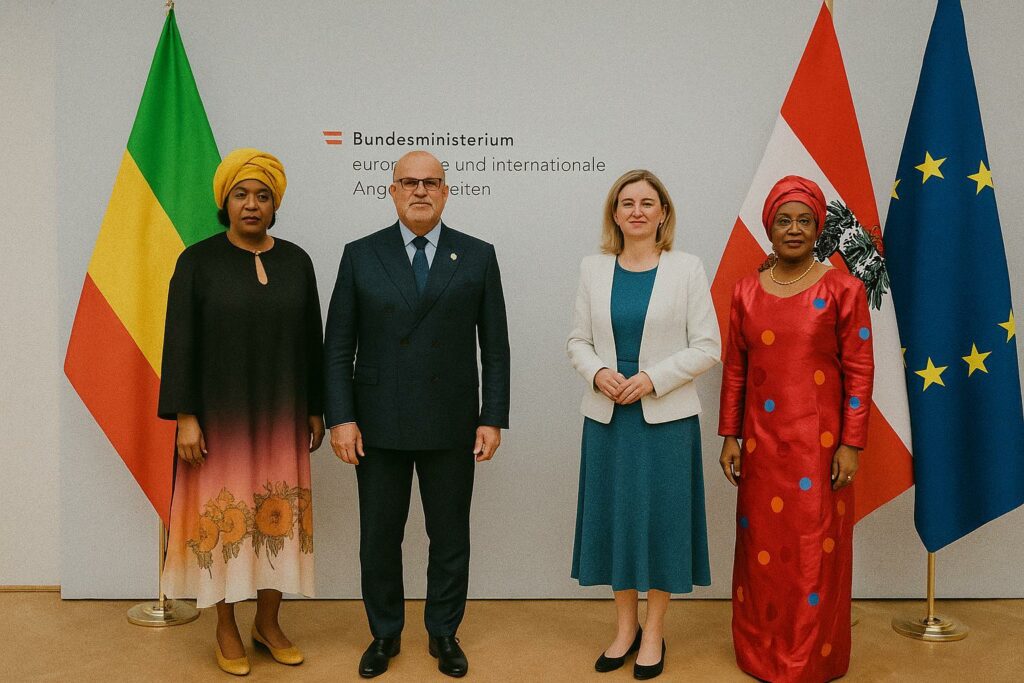A diplomatic conversation that moved the needle
Seasoned observers of Austria’s understated diplomacy were caught off guard when Foreign Minister Beate Meinl-Reisinger granted a full afternoon to a Congolese ministerial troika, rather than the customary courtesy call allotted to delegations from mid-size African economies. According to interlocutors present in the Gothic splendour of the Minoritenplatz palace, the talks quickly pivoted from protocol to a frank inventory of converging interests (Austrian Foreign Ministry press release, 2024).
Building bricks and mortar for a new embassy
First on the agenda was Brazzaville’s long-delayed plan to open a permanent mission in Vienna, home to the UN Office, the OSCE and a constellation of technical agencies. Ambassador Édith Itoua, currently resident in Berlin, reiterated that President Denis Sassou N’Guesso has already signed the enabling decree. Vienna, eager to amplify Africa’s presence in its multilateral hub, pledged logistical facilitation, including temporary office space near the Vienna International Centre. In diplomatic terms, such assistance is not mere hospitality; it consolidates Austria’s narrative as a bridge between North and South, a concept repeatedly highlighted in its 2022 Foreign Policy Strategy.
Economic diversification meets Alpine technology
The conversation then shifted to a subject dear to both capitals: matching Congo’s quest for post-hydrocarbon diversification with Austria’s niche expertise in renewable technology and high-value wood transformation. Ministers Jean-Marc Thystère-Tchicaya and Rosalie Matondo emphasised that Congo’s Special Economic Zones legislation now provides twenty-year tax holidays and one-stop administrative windows for foreign investors, a framework validated by the African Development Bank last year (AfDB, 2023).
From the Austrian side, entrepreneur Karl Ernst Kirchmayer outlined a pilot scheme under which Tyrolean engineering firms would install modular biomass plants fed by Congolese forestry waste, generating both electricity for local grids and certified carbon credits for European markets. The proposition dovetails with Vienna’s Climate Action Plan, which mandates 100 % renewables in electricity generation by 2030 and encourages outward investment in carbon-negative projects (Austrian Climate Ministry, 2023).
Forests, figures and political symbolism
Numbers tell their own story. Austria’s 8.9 million inhabitants manage 4 million hectares of sustainably certified woodland, while Congo’s 5 million citizens preside over 22 million hectares of rainforest, the world’s second-largest carbon sink after the Amazon. By twinning Austrian process know-how with Congolese natural capital, both parties see a chance to shape global forestry norms in forthcoming COP negotiations.
Yet beyond kilowatts and cubic metres of timber, symbolism matters. For Vienna, partnering an African rainforest state helps rebut criticism that its climate diplomacy is Eurocentric. For Brazzaville, attracting capital from an EU member known for financial prudence bolsters its reformist branding after years of ratings downgrades (Moody’s, 2022).
Vote-trading in the corridors of New York
The most delicate portion of the meeting revolved around multilateral arithmetic. Brazzaville delivered a sealed letter from President Sassou N’Guesso lobbying Vienna to support the candidacy of Firmin Édouard Matoko—currently UNESCO Assistant Director-General—for the post of UNESCO Director-General in 2025. In return, Austria discreetly sought Congo’s endorsement for its announced bid to re-enter the UN Security Council for the 2027-2028 term. Although neither request is binding, such reciprocal pledges often prove decisive in secret ballots, as evidenced by the 2022 contest that vaulted Ecuador to the Council with 190 votes (UN General Assembly records, 2022).
Analysts in both capitals underline that these exchanges illustrate the enduring currency of vote-swapping, a practice sometimes criticised yet deeply embedded in General Assembly politics. As one Austrian diplomat put it off the record, “principled multilateralism requires arithmetic as well as ideals.”
Calibrating expectations amid cautious optimism
The joint communiqué stops short of announcing binding agreements, reflecting Vienna’s traditionally incremental style and Brazzaville’s budgetary constraints. Nonetheless, a follow-up technical mission headed by Austrian green-tech firms is pencilled in for early autumn, while Congo has scheduled ground-breaking for its Vienna embassy before year-end, subject to parliamentary appropriation. If both timelines hold, the modest meeting could mature into a showcase of Afro-European climate partnership and diplomatic horse-trading in equal measure.
For now, diplomats on Minoritenplatz and in Brazzaville’s riverside ministries are engaged in the unglamorous work of drafting memoranda, aligning legal frameworks and counting General Assembly votes. In a world where great-power rivalries often overshadow mid-tier actors, the Austria-Congo courtship offers a reminder that smart, mid-sized states can still leverage natural capital and technical finesse to punch above their demographic weight.

